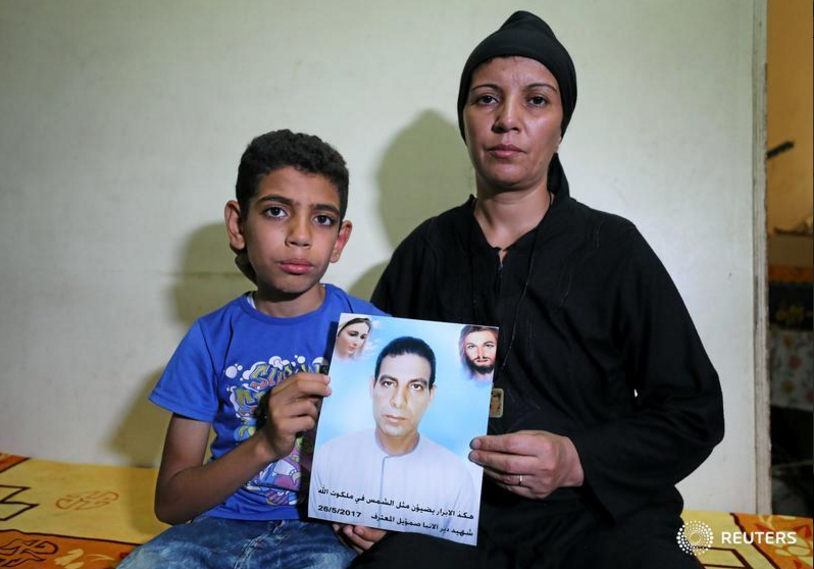Last month, Islamic State terrorists ambushed a group of Coptic Christians traveling to a monastery in southern Egypt, killing 29 and maiming 24. Among the group was beloved husband and father, Adel Habib.
READ: Terrorists Unleash Deadly Attack on Bus Full of Coptic Christians Heading to Holy Site to Pray
In an interview with Reuters published Tuesday, Habib’s widow and son describe life in their Christian village following the attack.
Seven of the people murdered last month resided in the village of Dayr Jarnous, where Habib’s family still lives. Local residents told Reuters that the Egyptian government has done nothing to help the victims’ families or to ensure that similar attacks on Christians won’t happen again.
Habib’s two sons, Mina, 10, and Marco, 14, were with their father when he was killed. Mina told Reuters it was a miracle that he and his older brother were spared.
Habib and his sons were in a pickup truck headed to the monastery of Saint Samuel the Confessor when Islamic State militants confronted them. Just a little further up the road, they could see the bloodied bodies of slain Christians who had gone ahead of them strewn across the desert street.
“We saw dead people, just dumped on the ground,” Mina recalled.
“They asked my father for identification then told him to recite the Muslim profession of faith. He refused, said he was Christian. They shot him and everyone else with us in the car,” he said.
"He said he was Christian, they shot him," says son who saw father die #Egypt https://t.co/TboJCNLO68 pic.twitter.com/H78USoI7LX
— Reuters Africa (@ReutersAfrica) June 20, 2017
Mina, who estimated that there were around 15 gunmen, says he doesn’t know why he and his brother — both Christians — were spared.
“They saw us in the back of the truck,” he said. “They made us get down and a man wearing camouflage like the army pointed his gun at us, but another one in all black told him to let us go. Every time they shot someone they would yell ‘God is great.’”
Mina, who rarely leaves home these days, is receiving therapy at a local church. Marco has sought his own form of therapy as well, making frequent visits to a local monastery to read the Bible and pray. In fact, Marco wasn’t available to be interviewed because he was at the monastery when reporters visited his home.
On the day of the attack, Marco Habib called his mother, Hanaa Youssef, as soon as he and Mina were safe.
“I first thought it was someone trying to take the truck, I never thought it would be terrorism,” Youssef told Reuters. “My husband has been going to the monastery for 25 years and nothing like this had ever happened.”
Now, Youssef says she only allows her boys out of the house for therapy and church.
The government has offered the Habib family nothing in the way of therapy or security in the weeks since the attack. Village residents told Reuters that they fear they are vulnerable to another attack and want President Abdel Fattah al-Sisi to keep his promise to protect Christians.
“Security, the government, and the army are negligent. No one protects us other than God. It is known that Christians are not protected in this country,” Kirolos Ishak, a university student whose father was also killed by the Islamic State that day, told Reuters.
In recent months, multiple attacks on Egypt’s Coptic Christians have left about 100 dead.
Egypt’s Copts, who make up about 10 percent of the population, supported Sisi, who promised to crack down on Islamist militants and protect Christians. But many Christians feel that the government has fallen short of that promise.
“Our Muslim neighbors say ‘you chose Sisi’ but ever since he came to power we are the ones who have suffered, not them,” Youssef said. “Churches and people have been attacked, people have been kidnapped, we are suffering.”



